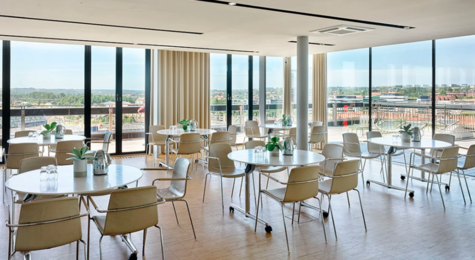Mads Rosendahl Thomsen is Professor of Comparative Literature at Aarhus University, Denmark. He is the author of Mapping World Literature: International Canonization and Transnational Literature (Bloomsbury Academic, 2008), The New Human in Literature: Posthuman Visions of Changes in Body, Mind and Society (Bloomsbury Academic, 2013), a co-author with Stefan Helgesson of Literature and the World (Routledge, 2019), and the editor of several books, including World Literature: A Reader (Routledge, 2012), The Posthuman Condition: Ethics, Aesthetics and Politics of Biotechnological Challenges (Aarhus Universitetsforlag, 2012), Danish Literature as World Literature (Bloomsbury Academic, 2017), and Literature: An Introduction to Theory and Analysis (Bloomsbury Academic, 2017). He has published in the fields of literary historiography, modernist literature, world literature, canonization, and historical representations of the posthuman. He is a member of the Academia Europaea (2010–), the advisory board of the Institute for World Literature (2010–13, 2018–22), and of the executive committee of the International Comparative Literature Association (2016–22).
Jacob Wamberg is Professor of Art History, dr.phil., at Aarhus University. He works on an evolutionistic theory of the visual arts, especially in relation to world-making, technology, and biosemiotics. His present focus is posthuman aspects of avant-garde art. He is the author of Landscape as World Picture: Tracing Cultural Evolution in Images ((Aarhus University Press, 2009), two volumes), and he has edited the anthologies Art & Alchemy (Museum Tusculanum Press, 2006), Totalitarian Art and Modernity ((Aarhus Universitets Press, 2010) with Mikkel Bolt Rasmussen), The Posthuman Condition: Ethics, Aesthetics and Politics of Biotechnological Challenges ((Aarhus Universitetsforlag, 2012), with Kasper Lippert-Rasmussen and Mads Rosendahl Thomsen), and Art, Technology and Nature: Renaissance to Postmodernity ((Ashgate Publishing, 2015), with Camilla Skovbjerg Paldam).
Steve Fuller is Auguste Comte Professor of Social Epistemology in the Department of Sociology at the University of Warwick, UK. Originally trained in history and philosophy of science, Fuller is best known for his foundational work in the field of “social epistemology,” which is the name of a quarterly journal that he founded in 1987 as well as the first of his twenty-five books. From 2011 to 2014, he published a trilogy relating to the idea of a “post-” or “trans-” human future, all published with Palgrave Macmillan under the rubric of “Humanity 2.0.” His most recent books are Post-Truth: Knowledge as a Power Game (Anthem, 2018) and Nietzschean Meditations: Untimely Thoughts at the Dawn of the Transhuman Era (Schwabe, 2019). His works have been translated into thirty languages. He was awarded a D.Litt. by the University of Warwick in 2007 for sustained lifelong contributions to scholarship. He is also a Fellow of the Royal Society of Arts, the UK Academy of Social Sciences, and the European Academy of Sciences and Arts.
Karin Kukkonen is Professor in Comparative Literature at the University of Oslo. Her research interests lie in eighteenth-century literature, cognitive narratology, and the history of poetics. She has published A Prehistory of Cognitive Poetics: Neoclassicism and the Novel (OUP, 2017) and 4E Cognition and Eighteenth-Century Fiction: How the Novel Found Its Feet (OUP, 2019) on these topics. Probability Designs: Literature and Predictive Processing (OUP) is forthcoming. At the University of Oslo, Kukkonen convenes the interdisciplinary research and teaching initiative Literature, Cognition and Emotions (2019–23). In 2019, she was awarded the first University of Oslo Younger Researchers’ Prize.
Ursula K. Heise teaches in the Department of English and at the Institute of the Environment and Sustainability at UCLA. Her research and teaching focus on contemporary literature; environmental culture in the Americas, Western Europe and Japan; narrative theory; media theory; literature and science; and science fiction. Her books include Chronoschisms: Time, Narrative, and Postmodernism (Cambridge University Press, 1997), Sense of Place and Sense of Planet: The Environmental Imagination of the Global (Oxford University Press, 2008), Nach der Natur: Das Artensterben und die moderne Kultur (After Nature: Species Extinction and Modern Culture, Suhrkamp, 2010), and Imagining Extinction: The Cultural Meanings of Endangered Species (University of Chicago Press, 2016).
Heise is the Managing Editor of Futures of Comparative Literature: The ACLA Report on the State of the Discipline (Routledge, 2016), and co-editor, with Jon Christensen and Michelle Niemann, of The Routledge Companion to the Environmental Humanities (2016). She is editor of the bookseries, Literatures, Cultures, and the Environment with Palgrave-Macmillan and co-editor of the series Literature and Contemporary Thought with Routledge. She is a 2011 Guggenheim Fellow and served as President of ASLE (Association for the Study of Literature and the Environment) in 2011.
Alexander Wilson is a Canadian researcher with the Institute of Research and Innovation, Centre Pompidou, Paris (France). He is the author of Aesthesis and Perceptronium: On the Entanglement of Sensation, Cognition, and Matter (University of Minnesota Press, 2019). From 2015 to 2018, he held a post-doctoral research position in Communication and Culture at Aarhus University (Denmark), where he examined the logical and material conditions of cognition in regard to technogenesis, technological pessimism/optimism, the digitalization and automation of contemporary life, and the specter of the posthuman. He formerly held an assistant professorship at Concordia University, Montreal (Canada). He is currently based in Berlin (Germany).
As our ideas of the human have come under increasing challenges – from technological change, from medical advances, from the existential threat of climate crisis, from an ideological decentering of the human, amongst many other things – the 'posthuman' has become an increasingly central topic in the Humanities. Bringing together leading scholars from across the world and a wide range of disciplines, this is the most comprehensive available survey of cutting edge contemporary scholarship on posthumanism in literature, culture and theory.
Read more and buy the book at:
www.bloomsbury.com/us/the-bloomsbury-handbook-of-posthumanism-9781350090477/

The venue for the book launch will be The Sunset Lounge, located at the top of ARoS art museum in Aarhus.